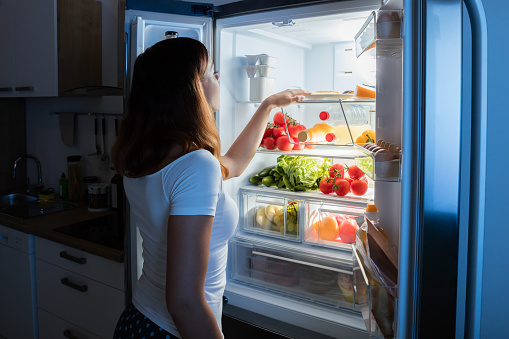Is your bosch refrigerator ice maker slow? Ice makers are a fantastic addition to any home refrigerator, and they can really help to keep your food and drinks cold. However, like any appliance, they need to be properly cared for in order to maintain their optimal performance.
One important part of proper care is regular cleaning, and today we’re going to show you how to clean a Bosch refrigerator ice maker.
Check Your Fridge Manual
Before you start any cleaning, it’s always a good idea to check your fridge manual. Some ice makers have special instructions that should be followed in order to avoid damage.
Turn Off and Remove Your Ice Maker Bin
The first step is to turn off your ice maker. On most models, there will be a switch on the front or side of the fridge that you can use to do this. Once the ice maker is turned off, remove the bin.
This will give you better access to all of the parts that need to be cleaned.
Wipe Down the Exterior
Start by wiping down the exterior of the ice maker with a clean, dry cloth. This will remove any dust or dirt that has accumulated on the surface.
Clean the Ice Maker Blade
Next, you’ll need to clean the ice maker blade. This is the part that actually cuts the ice, so it’s important to make sure that it is free of any dirt or debris. The best way to clean the blade is to use a toothbrush and some distilled vinegar.
Dip the toothbrush in the vinegar and then use it to scrub the blade. Rinse the blade well with water when you’re finished.
Clean the Ice Maker Tray
The ice maker tray is where the ice is actually formed. It’s important to make sure that this tray is clean so that the ice will be of the best quality. The best way to clean the tray is to fill it with a solution of equal parts water and distilled vinegar.
Let the tray soak for a few minutes, and then use a sponge or brush to remove any dirt or debris.
Reassemble Your Ice Maker
Once all of the parts have been cleaned, you can reassemble your ice maker. Start by putting the bin back in place, and then turn on the ice maker. Allow it to run for a few minutes so that it can fill the bin with fresh, clean ice.
Your Bosch refrigerator ice maker is now ready to use!
Additional Tips and Tricks
In addition to regular cleaning, there are a few other things you can do to keep your Bosch refrigerator ice maker in top condition. Here are a few tips and tricks:
- Descaled your fridge regularly. This will help to prevent mineral buildup, which can reduce the performance of your ice maker.
- Use filtered water. Filtered water will taste better and it will also produce better-quality ice.
- Clean the air vents. The air vents on your fridge help to circulate air, and if they become blocked, it can affect the performance of your ice maker. Use a vacuum attachment to clean the vents and keep them clear.
- Check for leaks. Over time, the seals on your fridge can become worn, which can cause leaks. If you notice any water leaking from your fridge, it’s important to have the seals checked and replaced as necessary.
By following these simple tips, you can keep your Bosch refrigerator ice maker clean and performing at its best. Regular cleaning will help to prolong the life of your ice maker and ensure that it always produces high-quality ice.
How Often Should You Clean an Ice Machine?
Most ice machines should be cleaned at least once a week, and more often if they are used frequently. How often you clean your ice machine will depend on how often it is used and how hard water is in your area.
If you have hard water, you may need to clean your machine more often to prevent mineral buildup.
Should I Run Vinegar Through My Ice Maker?
You can use vinegar to clean your ice maker, but it’s not necessary. You can use distilled water to clean the parts of your ice maker, or you can purchase a commercial cleaning solution specifically for ice machines.
If you do choose to use vinegar, make sure you dilute it with water so that it doesn’t damage any of the parts of your ice maker. You should also rinse the parts well with water after cleaning them with vinegar.
Why is My Freezer Ice Maker Making Dirty Ice?
There are a few possible reasons why your freezer ice maker might be making dirty ice. One possibility is that the water filter needs to be replaced. Another prospect is that the ice maker itself needs to be cleaned. If you notice that the ice is discolored or has an odd taste, it’s important to clean the machine and check the water filter.
You should also make sure that you are using filtered water in your ice maker. Filtered water will produce better-quality ice than tap water. If you have hard water, you may need to descale your fridge regularly to prevent mineral buildup.
Is It Safe to Clean My Ice Maker With Bleach?
Yes, you can use bleach to clean your ice maker. However, you should be careful not to use too much bleach, as this can damage the parts of your machine.
You should also make sure you rinse the parts well with water after cleaning them with bleach.
In Summary – Bosch Refrigerator Ice Maker Slow
Cleaning your Bosch refrigerator ice maker is important to keep it in top condition. You should clean the machine at least once a week, and more often if it is used frequently.
Home cleaning remedies like vinegar and bleach can be used to clean the machine, but it’s important to use them carefully so as not to damage any parts.
Bosch refrigerators are known for their quality, but even the best appliances need regular care and maintenance.
By keeping your Bosch refrigerator ice maker clean, you’ll prolong its life and ensure that it always produces high-quality ice.


